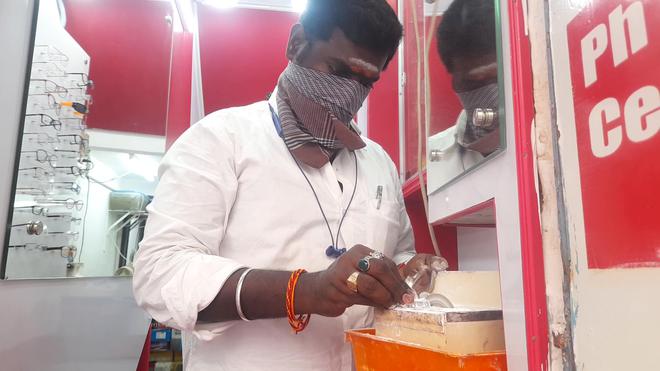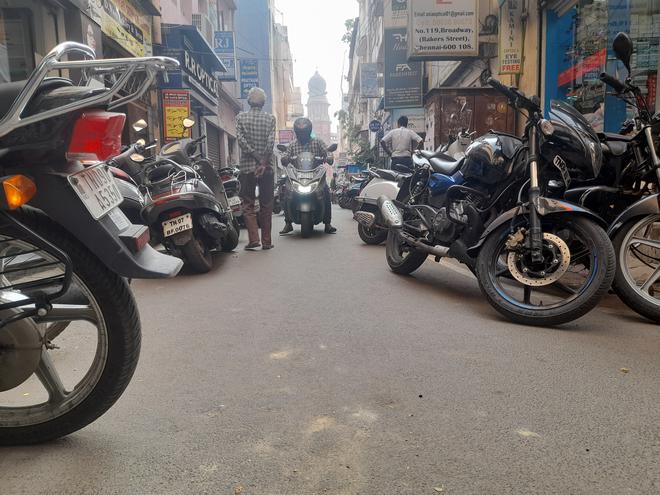At his eponymous opticals shop in Broadway, Palani is compelled to practise minimalism. A glass casing to display eyepieces and a lone chair behind it. A sliding door opens to a poky workshop that hoards a panoply of equipment and spares with which Palani plies his trade. Palani might be cooped up in a space that is barely three feet wide and a tad deeper than that, but he has a sense of expansiveness that comes from having captured his regulars’ “mind space”. It brings an invisible but undeniable dimension to his workspace and business. Palani is currently entertaining a customer from Thoothukudi, Mohammed Ali, who remarks that “my uncle referred me to this shop. He is a regular customer here.”

This picture of minimalism and enterprise repeats itself through Prakasham Salai, Bakker Street (the spelling as per the Greater Chennai Corporation’s nameboard) and Francis Joseph Street which together account for around 400 opticals shops. These shops make up the opticals hub in Broadway. In almost every shop, eyepieces are sold at the front end, and lens are ground and chiselled to fit frames, at the back end. This versatility ensures this hub’s relevance in a crowded market.
“Besides quick delivery of services, the rates are cheap. This is because anything related to opticals is available within these three streets,” says Easwaran, who owns a service centre for optical items. “I can repair/tighten a frame in 10 minutes or less. In other places, customers will have to wait more.”
Anitha Davey’s family has had a ringside view of how this market progressed from a handful of shops to the opticals hub that it is today. A third-generation entrepreneur of Davey Sons (established in 1970), Anitha elaborates: “My grandfather started this establishment. Then came Porwal and Bros, and subsequently a few others. There were a few scattered shops. Now every other shop is an optical shop here.”
An increase in outlets has caused the market to be up to date with its technology. A good number of shops invest in automatic equipment for eye testing and glass cutting, says Jagadeesan of Sri Ayiengaran Opticians on Francis Joseph Street. He owns an optical lensometer and a set of cutters and grinders. “There are machines in the market for automatic grinding and polishing too, in the range of ₹2 lakh to ₹15 lakh,” says Palani. Still, an equally high number of retailers rely on old ways and equipment to get the job done, Palani adds.
Dr. Hisamuddin, an eye-care professional who has worked at Davey Sons for 15 years, puts things in perspective when he says an automatic setup never gets too cramped to accommodate human skill — a trained eye for details is always relevant. As a collective, the opticals shops in this hub offer a collage of modern technological advancement and old-world skill.
Dr. Hisamuddin’s predecessors have also worked at Davey Sons, and have witnessed its transcending through the years.
Style and substance
As with any other market, this hub has had to reflect the fads of every decade without flinching at the thought. Palani notes that back then, the shape of the lenses mattered little. “Customers did not mind whether it was cat-eye glasses or round glasses. Now they do, demanding variety and we have to meet those demands.” Anitha believes frames in the past had a greater lustre and was of superior build, but she knows she has to suspend her judgement and cater to what buyers want.
Big opticals brands with their chain of outlets and attractive offers have weaned away a section of this hub’s customers, says Ekambaram, another retailer on Bakker street. Lack of mass advertisment strategies has a negative impact on the hub. But in a growing market, businesses such as those in this optical hub instinctively appreciate the power of personal connection.
Anitha nails it: “Some of our old customers bring their kids and grandkids and proudly tell them about us. Some of these regulars are from as faraway as the United States.”

Another issue that the retailers highlight here is the haphazard parking of vehicles in front of their shops by customers, as well as passers-by. “Most commuters leave their vehicles in front of our shops to board the Metro [the High Court Metro]. Already, the streets are narrow and haphazard and indiscriminate parking of vehicles reduces the space for movement of goods and customers,” contends Easwaran.







